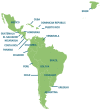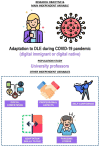Variables Influencing Professors' Adaptation to Digital Learning Environments during the COVID-19 Pandemic
- PMID: 35329422
- PMCID: PMC8951131
- DOI: 10.3390/ijerph19063732
Variables Influencing Professors' Adaptation to Digital Learning Environments during the COVID-19 Pandemic
Abstract
This paper conducts quantitative research on the influence of the COVID-19 pandemic on the adaptation to digital learning environments (DLE) of a group of 908 university professors. We compared the perceptions of participants who were digital natives (born before 1980) with those of digital immigrants (born after 1980). For this purpose, a validated survey was used and the obtained responses statistically analyzed. The results show a negative correlation between pandemic stress and the digital competence of professors and their adaptation skills to digital environments, which although weak for both of the two groups compared are stronger for digital immigrants. Both self-confidence and digital competence show a positive influence on the perception of adaptation of skills to DLE, and this is weaker in digital natives. Gaps were identified by gender and area of knowledge of the participants; consequently, the need to carry out training actions for university faculty on skills linked to their digital competence in teaching is clear.
Keywords: COVID-19 pandemic; digital competence; digitization process; psychological effects; stress.
Conflict of interest statement
The authors declare no conflict of interest.
Figures
Similar articles
-
Influence of Country Digitization Level on Digital Pandemic Stress.Behav Sci (Basel). 2022 Jun 22;12(7):203. doi: 10.3390/bs12070203. Behav Sci (Basel). 2022. PMID: 35877273 Free PMC article.
-
On the Influence of the University Tenure on the Digital Pandemic Stress in Higher Education Faculty.Behav Sci (Basel). 2023 Apr 17;13(4):335. doi: 10.3390/bs13040335. Behav Sci (Basel). 2023. PMID: 37102849 Free PMC article.
-
Digital Pandemic Stress in Higher Education in Venezuela.Eur J Investig Health Psychol Educ. 2022 Dec 13;12(12):1878-1900. doi: 10.3390/ejihpe12120132. Eur J Investig Health Psychol Educ. 2022. PMID: 36547033 Free PMC article.
-
University professors' mental and physical well-being during the COVID-19 pandemic and distance teaching.Work. 2021;69(4):1153-1161. doi: 10.3233/WOR-205276. Work. 2021. PMID: 34420997
-
[Impact of Nurse Practitioners and Nursing Education on COVID-19 Pandemics: Innovative Strategies of Authentic Technology-Integrated Clinical Simulation].Hu Li Za Zhi. 2021 Oct;68(5):4-6. doi: 10.6224/JN.202110_68(5).01. Hu Li Za Zhi. 2021. PMID: 34549401 Review. Chinese.
Cited by
-
Self-reported skills and self-confidence in point-of-care ultrasound: a cross-sectional nationwide survey amongst Finnish emergency physicians.BMC Emerg Med. 2023 Mar 1;23(1):23. doi: 10.1186/s12873-023-00795-w. BMC Emerg Med. 2023. PMID: 36859177 Free PMC article.
-
The Emotions, Coping, and Psychological Well-Being in Time of COVID-19: Case of Master's Students.Int J Environ Res Public Health. 2022 May 15;19(10):6014. doi: 10.3390/ijerph19106014. Int J Environ Res Public Health. 2022. PMID: 35627550 Free PMC article.
-
Evaluation of an Advanced Care Planning Training Program Incorporating Online Skills in Shared Decision Making: A Preintervention and Postintervention Comparative Study.Healthcare (Basel). 2023 May 8;11(9):1356. doi: 10.3390/healthcare11091356. Healthcare (Basel). 2023. PMID: 37174898 Free PMC article.
-
Nudge or not, university teachers have mixed feelings about online teaching.Humanit Soc Sci Commun. 2023;10(1):232. doi: 10.1057/s41599-023-01691-1. Epub 2023 May 12. Humanit Soc Sci Commun. 2023. PMID: 37200568 Free PMC article.
-
Investigating Learners' Teaching Format Preferences during the COVID-19 Pandemic: An Empirical Investigation on an Emerging Market.Int J Environ Res Public Health. 2022 Sep 14;19(18):11563. doi: 10.3390/ijerph191811563. Int J Environ Res Public Health. 2022. PMID: 36141861 Free PMC article.
References
-
- Mari E., Lausi G., Fraschetti A., Pizzo A., Baldi M., Quaglieri A., Burrai J., Barchielli B., Avallone F., Giannini A.M. Teaching during the pandemic: A comparison in psychological wellbeing among smart working professions. Sustainability. 2021;13:4850. doi: 10.3390/su13094850. - DOI
-
- Hussain M.W., Mirza T., Hassan M.M. Impact of COVID-19 pandemic on the human behavior. Int. J. Educ. Manag. Eng. 2020;10:35–61. doi: 10.5815/ijeme.2020.05.05. - DOI
-
- Verma G., Campbell T., Melville W., Park B. Science teacher education in the times of the COVID-19 pandemic. J. Sci. Teach. Educ. 2020;31:483–490. doi: 10.1080/1046560X.2020.1771514. - DOI
-
- Kruszewska A., Nazaruk S., Szewczyk K. Polish teachers of early education in the face of distance learning during the COVID-19 pandemic—The difficulties experienced and suggestions for the future. Education 3–13. 2022;50:304–315. doi: 10.1080/03004279.2020.1849346. - DOI
MeSH terms
LinkOut - more resources
Full Text Sources
Medical





